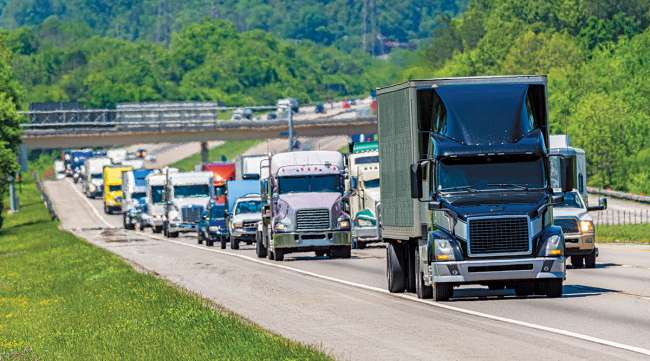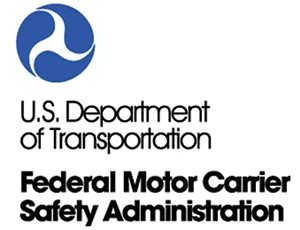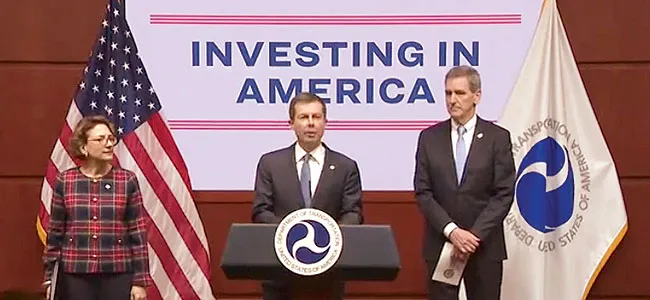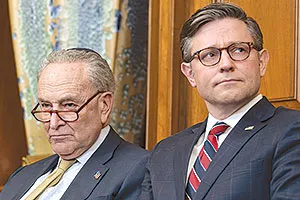Senior Reporter
White House Fiscal 2025 Budget Includes $964M for FMCSA

[Stay on top of transportation news: Get TTNews in your inbox.]
WASHINGTON — The country’s top trucking regulator would receive nearly $1 billion under a fiscal 2025 budget request the White House recently delivered to Congress.
For the Federal Motor Carrier Safety Administration, President Joe Biden’s budget would provide the agency $964.5 million for the fiscal cycle beginning Oct. 1.
The agency’s budget request consists of two components. For its safety operations division, the budget would dedicate $438.1 million, and for motor carrier safety grants, it would provide $526.4 million.
Regulating commercial vehicles, including heavy-duty trucks and motorcoaches, is the agency’s primary assignment. Per background the U.S. Department of Transportation provided, FMCSA’s budget proposal “sets the stage for investments in roadway safety, interstate commerce, [commercial motor vehicle] operations and driver safety. Investments also focus on addressing root causes of roadway safety, considering situations that may negatively impact driver behavior, such as driver compensation and the frequency and severity of detention times that can lead to speeding.”

“These investments and underlying policies,” according to DOT, “provide the resources needed to strengthen the safety focus to end fatalities on our nation’s roads.”
For other agencies, the White House is requesting the Federal Highway Administration receive $62.8 billion, the Federal Transit Administration receive $16.8 billion, the Federal Railroad Administration receive $3.2 billion, and the National Highway Traffic Safety Administration receive $1.2 billion. Overall, the White House’s fiscal 2025 budget request for federal government operations came in at $7.3 trillion.
Addressing reporters at the department’s headquarters March 11 alongside Deputy Secretary Polly Trottenberg and Federal Aviation Administration Chief Michael Whitaker, Transportation Secretary Pete Buttigieg defended the president’s budget.
“I would like to believe that the priorities that were laid out — the infrastructure gains that the deputy secretary walked through, the aviation safety improvements and enhancements that the administrator walked through, a measure like making sure that private jets pay their fair share into the system or any of the infrastructure priorities that we are talking about and asking be funded in this budget, including hiring more air traffic controllers — ought to be a bipartisan priority,” Buttigieg said.

Polly Trottenberg (from left), Pete Buttigieg and Michael Whitaker at USDOT headquarters addressing reporters. (C-SPAN)
“I certainly would expect any member of Congress on either side of the aisle who has expressed concern about something like air traffic control staffing or the sustainability financially of how we pay for the national aviation system or railway safety would, so to speak, put their money where their mouth is and support these measures,” the secretary continued.
Council of Economic Advisers Chairman Jared Bernstein told White House reporters March 11 that “I think, more practically, in terms of building up that longer-term potential growth rate, when we stand up domestic semiconductor production; when we stand up domestic electric vehicle, electric batteries; when we improve the nation’s infrastructure in ways that, in the previous administration, were a joke, in this administration are happening — all of those are pro-growth, pro-productivity, pro-supply side. They not only boost the economy’s capacity, as our numbers show, but they also help put downward pressure on inflation.”

Senate Leader Chuck Schumer (D-N.Y.) and House Speaker Mike Johnson (R-La.). Democrats and Republicans differ in their views of the budget request.
The White House’s new budget document already encountered partisan pushback on Capitol Hill. As expected, reaction to the annual request was divided along party lines. Speaker Mike Johnson (R-La.) and his senior team stand in opposition arguing, “The price tag of President Biden’s proposed budget is yet another glaring reminder of this administration’s insatiable appetite for reckless spending and the Democrats’ disregard for fiscal responsibility. Biden’s budget doesn’t just miss the mark — it is a road map to accelerate America’s decline.”
Meanwhile, Senate Leader Chuck Schumer (D-N.Y.) said, “This is the President’s budget in a nutshell: Lower costs, stronger Social Security, stronger Medicare, more investments in America and the American people, all while reducing the deficit. That’s something we can all get behind.”
Relatedly, congressional leaders continue to negotiate the terms of funding levels for defense-related agencies. Funding authority for the Pentagon and other defense-centric agencies expires March 22.
Want more news? Listen to today's daily briefing below or go here for more info:




